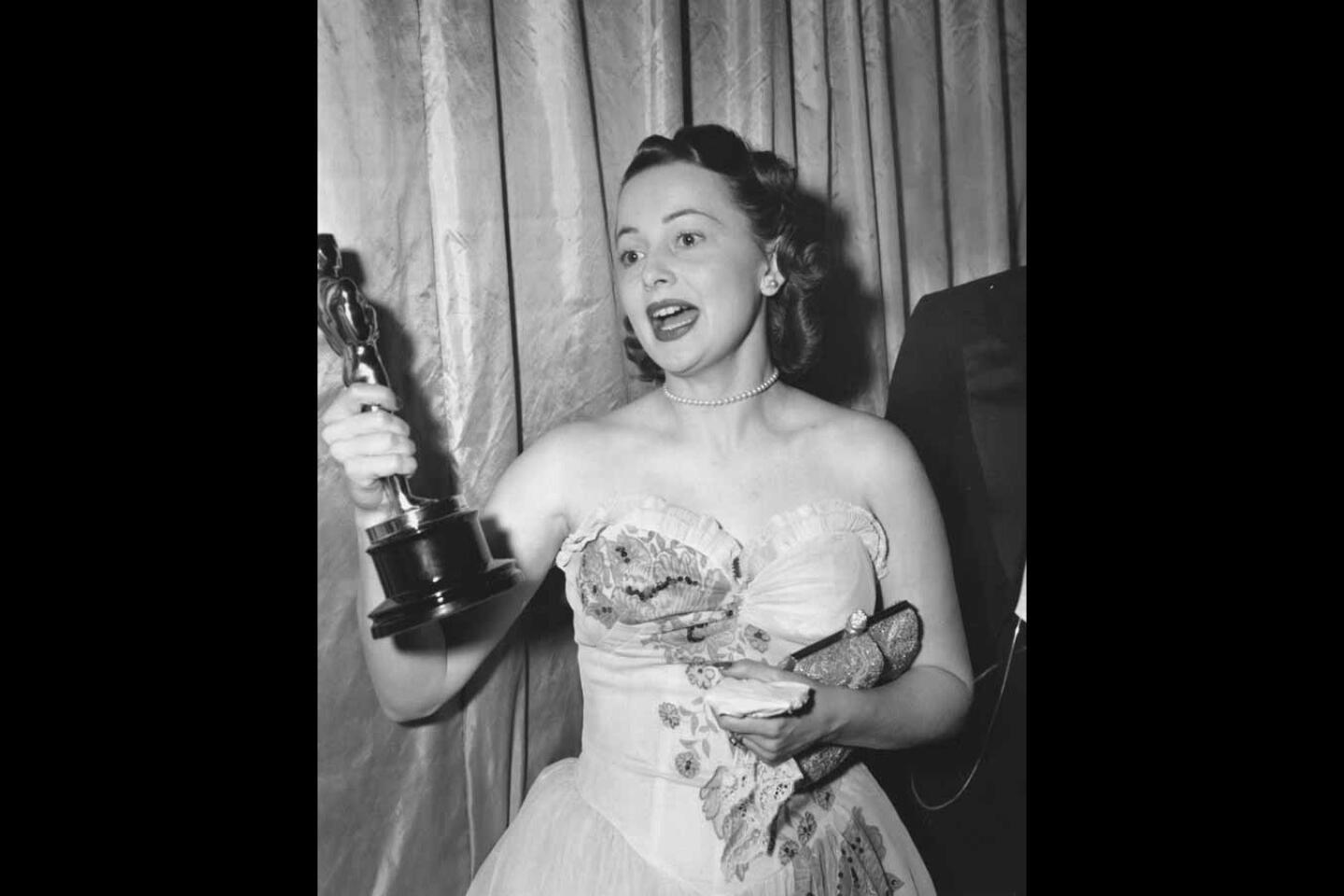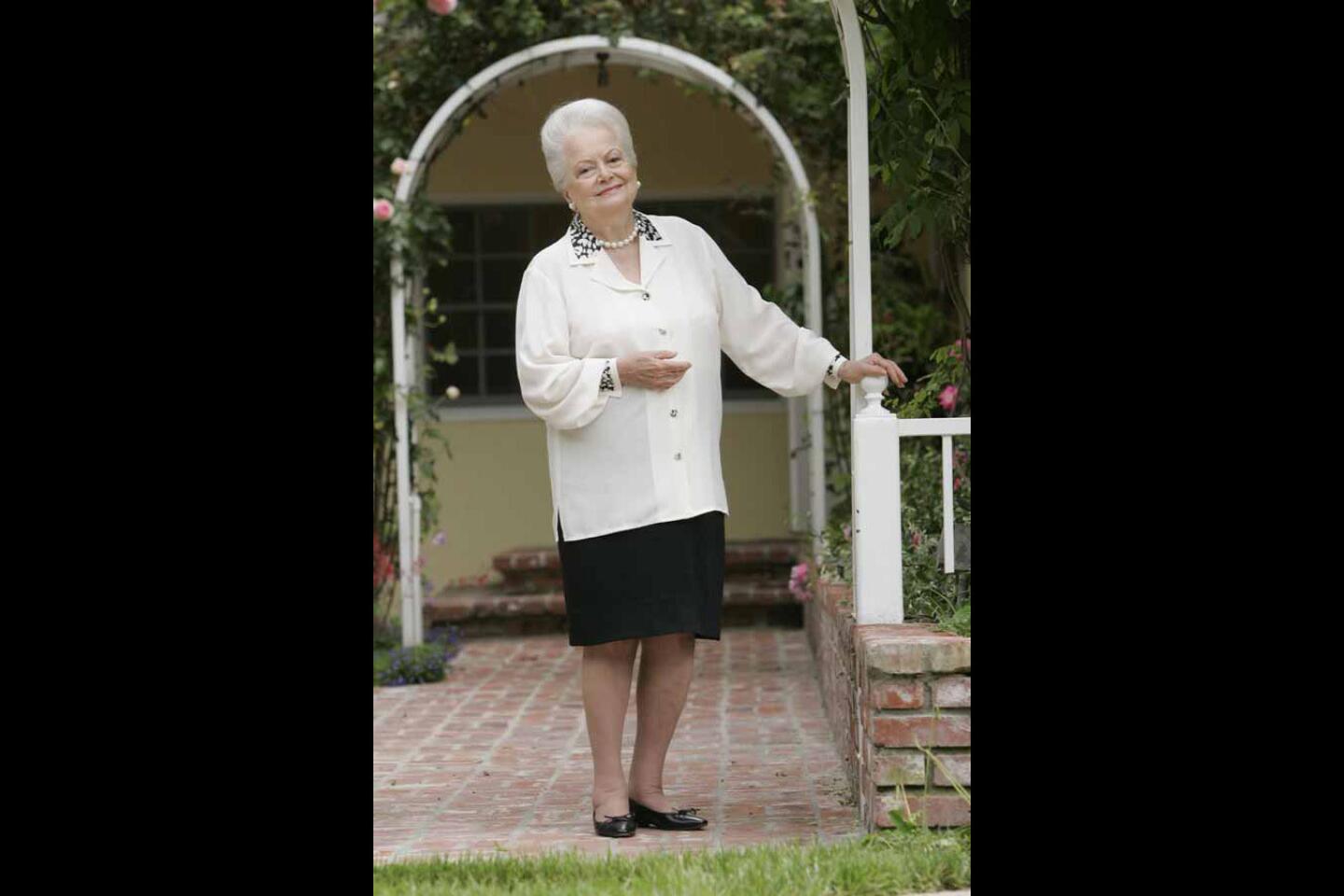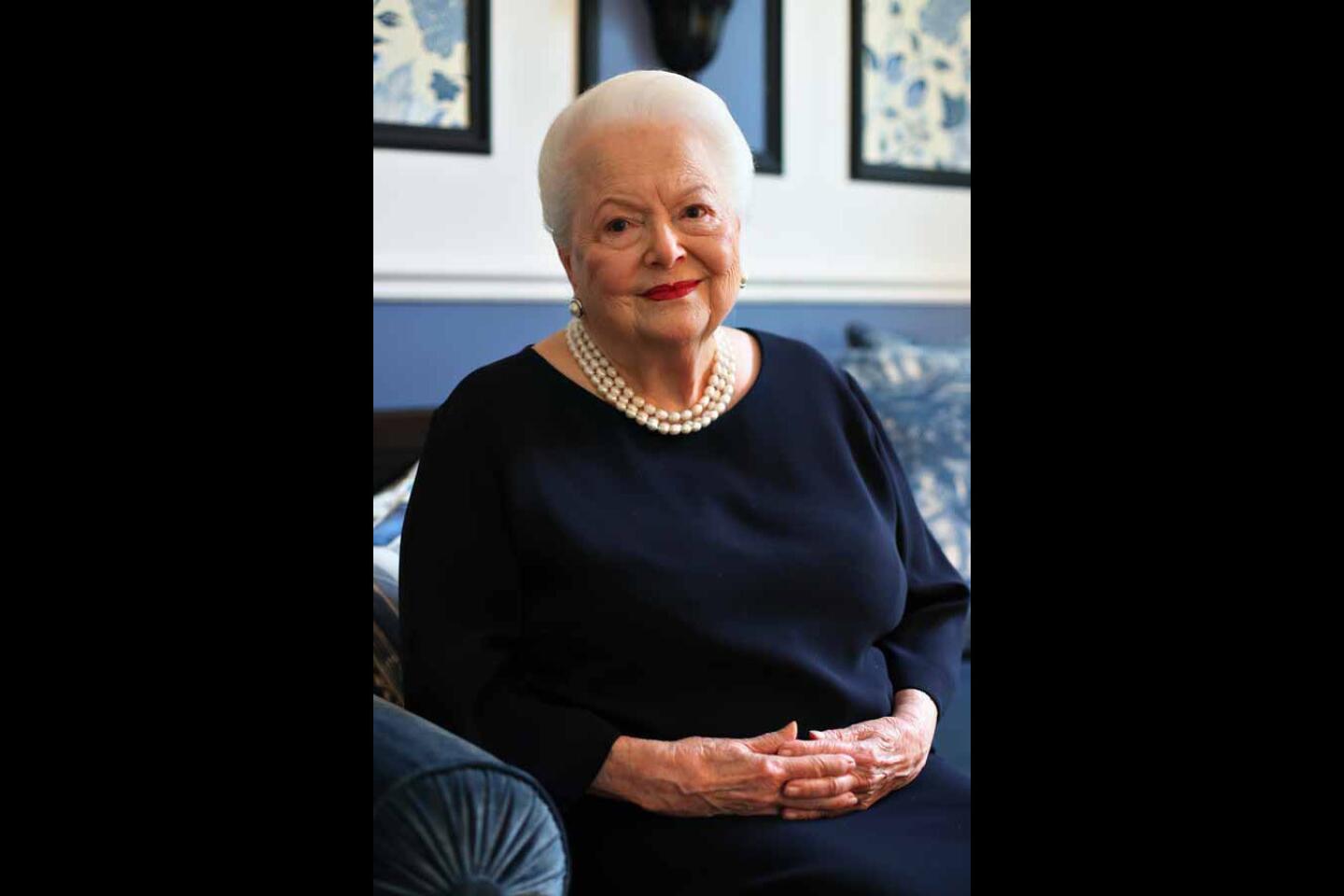Appellate court hears arguments in Hollywood legend Olivia de Havilland’s ‘Feud’ lawsuit
- Share via
Three California Court of Appeal judges heard arguments on Tuesday for and against veteran actress Olivia de Havilland’s lawsuit over her depiction in FX’s 2017 docudrama “Feud: Bette and Joan.”
The “Gone With the Wind” star’s legal team is attempting to move the case back to trial court after FX filed an anti-SLAPP motion to have it dismissed. However, an attorney for FX and a legal expert both encouraged the judges to prevent it from going to trial on the grounds that there was no evidence of actual malice.
Both sides submitted their oral arguments Tuesday during a hearing held at the University of Southern California’s Gould School of Law and a decision is expected within 90 days. However, de Havilland’s legal team believes it will come sooner given that the case has been expedited because of the actress’ advanced age.
The 101-year-old icon of Hollywood’s Golden Age lives in Paris and did not appear in court on Tuesday. Her daughter Gisele Galante Chulack, an L.A. resident, did attend the hearing.
De Havilland sued FX and Murphy in June over the unauthorized use of her identity in the Emmy-winning anthology series because, she alleges, the characterization cast her in a false light and violated her right to publicity.
In August, FX attempted to have the case dismissed altogether under California’s anti-SLAPP statute. But Los Angeles Supreme Court Judge Holly Kendig greenlit the case a month later, ruling that de Havilland had a substantial probability of prevailing at a jury trial. FX then filed an appeal, thereby delaying the trial, but de Havilland’s team filed another motion to have it expedited.
In the anthology, the two-time Academy Award winner is played by fellow Oscar winner Catherine Zeta-Jones, who provides commentary on the storied rivalry between actresses Bette Davis (Susan Sarandon) and Joan Crawford (Jessica Lange). De Havilland’s suit accused FX and its partners of appropriating her name and identity “to sensationalize the series and to promote their own businesses” while ignoring her interests entirely.
Kelly Klaus, the attorney representing the appellants, argued that de Havilland’s case should be dismissed because she is a living person who is enmeshed in the history of Hollywood.
“She played a pivotal role in the events ‘Feud’ dramatized,” Klaus argued.
He also noted that each of de Havilland’s four false-light claims would have “to clear the high hurdle of actual malice.”
“She is a public figure and the matters discussed in ‘Feud’ are of public interest,” he said.
The false-light claims, her team argued, stem from the series portraying her as a gossip, falsely depicting her in an interview that never happened, portraying her as “a vulgarian” for using the word “bitch” on two occasions and disparaging singer Frank Sinatra.
Klaus said that the court would have to prove that there was actual malice and there must be clear and convincing evidence that producers meant to cast her in a negative light or had reckless disregard for the truth. In fact, he argued, producers attempted to show her in a positive light as a consummate professional who “softened the hard edges of Bette Davis,” he said.
FX contends that de Havilland’s consent was not needed to include her in the series, nor did her inclusion violate her right of publicity. They argued that de Havilland “cannot carry her burden of showing a probability of prevailing on any of her four causes of action” under the state’s anti-SLAPP statutes protecting petition and free-speech rights, according to legal documents submitted in the case.
De Havilland is backed by the Screen Actors Guild, but the Motion Picture Assn. of America and streaming giant Netflix, which recently inked a lucrative deal with Murphy, aligned themselves with FX by filing amicus briefs in January encouraging the court to reverse Kendig’s decision.
Jennifer Rothman, a legal expert on the right of publicity who filed an amicus brief in the case, said that the right “protects against exploitative use of a person’s identity” and that doesn’t really apply in de Havilland’s case.
“It’s clear that this is a transformative use,” Rothman said. “She did not appear in ‘Feud’; Catherine Zeta-Jones did.”
Rothman argued that “Feud” did not seek to exploit de Havilland — it used her to tell a story. If the case went to trial and prevailed, she said, the court would set a dangerous precedent for future right of publicity claims that could be brought “simply based on a name,” which would be devastating to journalists, filmmakers and documentarians.
“We cannot recount historical events without the people who participated in them,” she said. “The limits of rights of publicity claims were met here.”
De Havilland’s attorney, Suzelle M. Smith, fielded questions from the judges about the cases submitted for precedent, whether there was a difference between calling a person a “bitch” versus a “dragon lady” and whether there was actual malice in FX’s depiction of de Havilland.
Smith said that because false statements were put in de Havilland’s mouth in the series, that false portrayal upholds the actress right of publicity. She encouraged the judges not to try the case in appellate court and deny the actress the right to a jury trial but to let it move back to Superior Court, where it had been brought in the first place.
She argued that a celebrity should have the right to control his or her identity — not censor it — and be compensated for its use. De Havilland was not afforded those options because FX and Murphy never asked her permission, Smith said.
“The proper way to do this is to ask permission and compensate her,” she said, explaining that if FX is paid for its creative work, then de Havilland should be compensated for the work she put into building up a reputation as a professional.
“This case is a really easy call,” she concluded.
De Havilland proved victorious in appellate court before: Her landmark labor lawsuit against Warner Bros. resulted in the collapse of the binding long-term contract system and put the De Havilland Law on the books in 1944.
“In my dispute with FX for the series ‘Feud,’ I have nothing against actor Catherine Zeta-Jones,” de Havilland wrote in this newspaper this month in response to Rothman’s op-ed about the lawsuit.
“What I am vehemently opposed to is the attribution of outright fabrications to one’s character,” de Havilland wrote. “The creators of ‘Feud’ not only used my identity without my consent, but they also put false words in my mouth.
“Studios, which choose to chronicle the lives of real people,” she added, “have a legal and moral responsibility to do so with integrity.”
But if de Havilland triumphs again, experts argued that the effect could chill free speech and restrict studios’ artistic expression.
See the most-read stories in Entertainment this hour »
Follow me: @NardineSaad
More to Read
The complete guide to home viewing
Get Screen Gab for everything about the TV shows and streaming movies everyone’s talking about.
You may occasionally receive promotional content from the Los Angeles Times.










